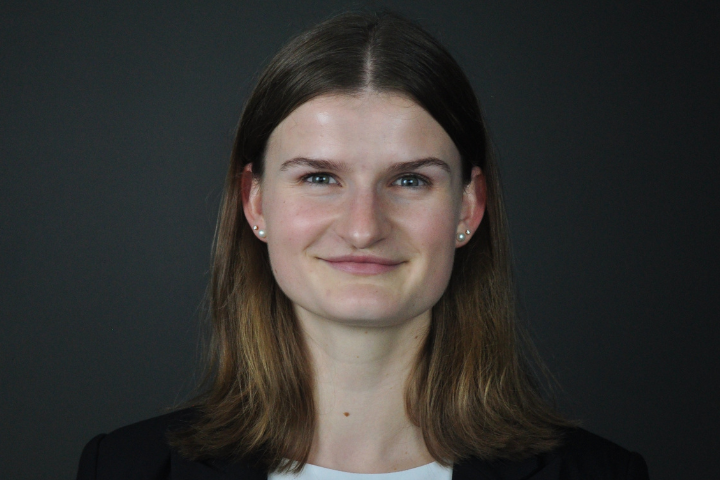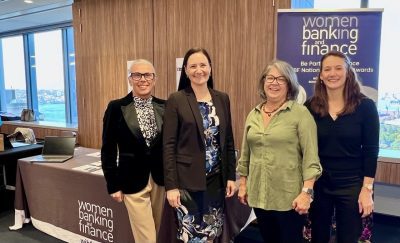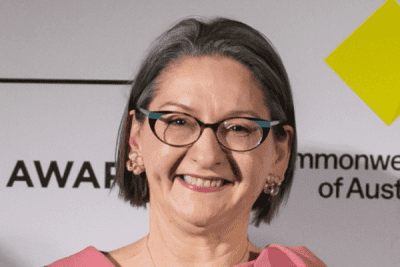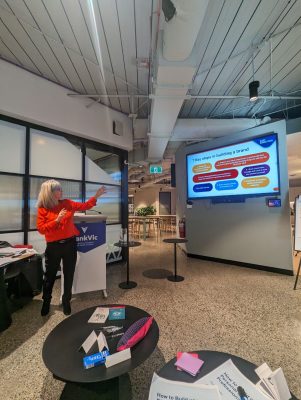Spotlight on a Futures Trader: Isabel Beaumont (Macquarie Futures)
07 Aug 2024
In the fast-paced world of futures trading, success requires curiosity, adaptability, and a willingness to learn. Recently, WiBF interviewed Isabel Beaumont, a trader at Macquarie Futures, who exemplifies these traits and her journey highlights the dynamic and rewarding nature of the industry.
In this spotlight, she shares her experiences, steep learning curves, and invaluable lessons, offering an insider’s perspective on futures trading at a leading financial institution.

What sparked your interest in trading futures?
I joined Macquarie as an intern during the summer of 2020/21, where the idea of working in commodities and global markets appealed to me because the work seemed exciting and dealt with tangible assets that impact us all in one way or another. There are also mobility opportunities – the chance to live and work overseas.
Did you know about futures before you started?
I definitely didn’t know a lot about futures when I started and felt quite naïve at times. Going into the internship I had really only seen representations of trading in movies, so I initially wondered if people would be yelling client instructions all the time and throwing paper around to indicate they’ve made a trade. Fortunately, in my experience, the Hollywood portrayal isn’t accurate, partly due to the advent of electronic trading and automation/straight-through-processing. But on the flip side is it wouldn’t make a dramatic movie!
What is the atmosphere like?
It really depends on the day, what’s happening globally and what might be on the calendar for that week. There can be incredibly busy times, but there can also be quieter times. There will always be some quite high-pressure moments when trading, and that’s when our ability to work as a team and support each other shines through. That’s what makes it an enjoyable team to be a part of.
Can you describe the learning curve when you started?
Steep is the best word to describe it! But the fantastic thing about being an intern is you’re in an environment where you are just encouraged to learn as much as possible. I started in the middle of the COVID pandemic, so lockdowns were rife and the cash rate was at 0.1%. In the fixed income/rates space, things were quiet and there was zero volatility. I recall people on the desk apologising to me about how quiet it was but I was grateful – it was a perfect environment to learn the basics, pick people’s brains in their spare time, etc. On the flipside, shortly after I returned as a grad, Russia-Ukraine geopolitical tensions escalated. Markets become incredibly volatile. At that point I was glad to have some experience on the desk already so I wasn’t completely out of my depth.
Can you explain in “101” terms what you do and how long you’ve been in your role?
Futures execution involves trading listed derivatives (futures and options) as an agent for institutional clients across a range of global markets. We have specialists in fixed income, rates, equity indices, energy and commodities. I completed a Macquarie Summer Internship with the Futures Execution team between December 2020 – February 2021 and returned to the desk as a graduate full time in 2022. So, nearly over two years full time now.
You said you’re also the night desk for markets offshore. Are you dealing with clients who are insomniacs?
Yes, so being based in Sydney, we are awake while many of those in European and North American markets are asleep. We provide overnight support for our desks in London and New York, and you do get clients awake at all hours, placing and checking orders / market prices / etc. When we need to engage market makers to price things for us in offshore markets, we are definitely waking people up – but that’s part of their job!
Who or what are market makers?
Market makers play an important role in the markets we trade. They provide liquidity by supplying updated quotes and pricing during the day. Other buyers/sellers can accept a market maker’s quote – resulting in a trade with that market maker. Market makers work for various firms and are incentivised by the exchange to provide their service in various ways. We deal with them for a range of things but mainly it’s option and block pricing for offshore exchanges.
What area within futures have you focused on?
We have specialists in all the major asset classes on the desk which has really allowed me to gain experience in a lot of different products. When I started as an intern, I sat with someone very experienced in Australian bond and rates futures broking. When I came back as a graduate, I was sitting with people from the team who had more of a commodities focus, particularly power and agricultural commodities. My goal is to ultimately be across all these different parts of the business; however, I do find the commodities space particularly interesting because of the point about them being tangible assets.
Was there a lot to learn?
As I was coming into the role without a finance background, I personally found the learning curve quite steep. I studied Science and Economics at uni, and while economics obviously provided helpful background and macroeconomic understanding – it still didn’t teach me the ins and outs of futures and options and all the contract specs and strategies that surround them. But being an intern on the desk was fantastic in this sense and at times I felt like I was back at uni, except I was learning an entire degree’s worth of information in ten weeks. The team was generous and great at getting me involved and moving me around the team to see different things. Ultimately there is so much you learn on the job that it doesn’t really matter your background when starting out so long as you come in with a learning mindset and commitment to that. To this day, the learning continues, but more nuanced things like why certain clients trade futures in certain ways, the different players, best times for liquidity, etc. It all takes getting used to.
What is the client contact like?
Each day we are speaking to clients, sharing market commentary, executing orders, responding to questions, and also performing a sales role. Beyond the day to day, we catch up with clients and this is always an opportunity for me to better understand their needs and how they use futures. This ultimately makes trading easier as you are trading for someone you know, which means you can understand what they are looking for from a broker and what providing the best service looks like for them.
Any tips on how to learn in your role?
· Ask questions and be curious.
· Learn by doing – put your hand up for things and don’t be afraid to contribute. This builds your technical skills base as well.
· Be proactive and seek out information to fill your knowledge gaps. Subscribe to news/research/market commentary.
· Try and meet as many people as possible; not only does that broaden your network but its great for learning about the diverse work being undertaken around you and how it all ties together.
You had mentioned mobility for yourself as a career aspiration. Where would you like to work?
Internal mobility is an opportunity that’s available at Macquarie and many of my colleagues have worked on our desks in London and New York. I think working in one of those big financial centres would be awesome, not only from a lifestyle perspective (the proximity to the rest of Europe for example), but also from a futures perspective, as they really are bigger and more liquid markets, so things happen there that you don’t really see in the APAC time zone.
How do you manage risk when trading?
Because we are brokers, we trade in an agency manner rather than a proprietary manner. This means we only trade for clients when instructed, rather than trading based on our own decisions, and taking on our own positions. Therefore, our main risk is execution risk. This is the risk of not achieving the fill that the client wanted – say because the market moves or it is illiquid or there is a price slippage, or alternatively, because a human or system error occurred. There are many risks involved in trading and being aware of them is key, developing a good risk culture mindset, good checks and a strong supervisory framework is all important in managing them.
How do you approach analysis and decision making when trading for clients?
Knowing the client and knowing the market is critical. Because every different type of futures contract trades differently – different pricing, structure, liquidity, and market players all mean that different execution techniques are desirable. Clients are of course different too, including their levels of familiarity with futures and price sensitivity. Some people have traded futures their whole careers and they know exactly how they want us to execute for them. Others might not know a lot about the product or futures in general and leave the execution totally up to us. You get to know the nuances of both markets and clients, and you can work from there.
Are there any changes in your field you are excited about?
One thing that’s on the horizon is the development of a carbon futures market in Australia. I find this exciting from both a personal and professional perspective, as a robust futures market will represent part of the broader energy transition that is occurring in Australia now. We have seen significant interest in the listing of carbon contracts as well, so it is an important development.
WiBF offers a range of opportunities for professional development and networking, including in-person graduate events perfect for recent graduates. These events provide an ideal platform for young professionals to connect, expand their knowledge, and learn from industry leaders. Additionally, WiBF members have access to unlimited free webinars covering various industry topics, exclusive programs, and masterclasses designed to enhance your skills and career growth.
We extend our sincere thanks to Macquarie, a proud WiBF Diamond member, and Isabel Beaumont from Macquarie Futures for their collaboration on this article. We hope this story inspires future leaders in this space.



